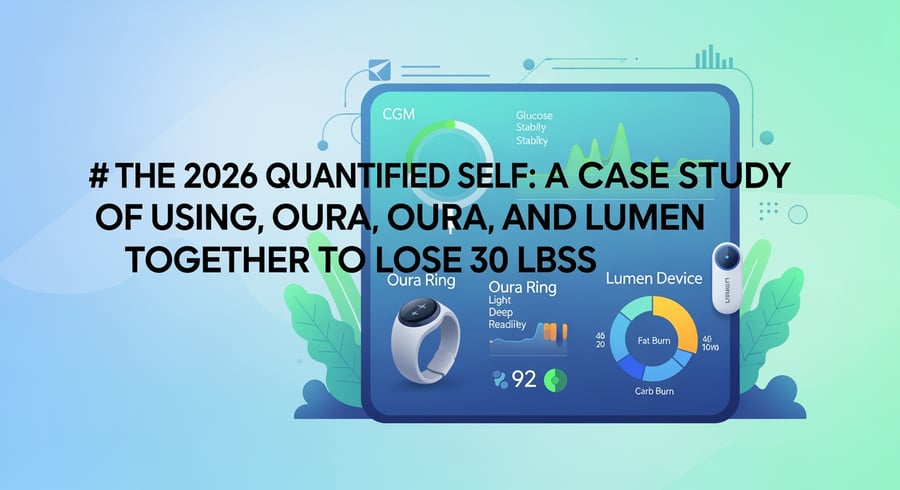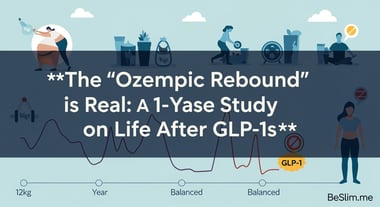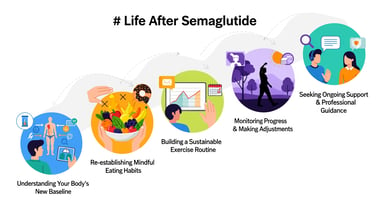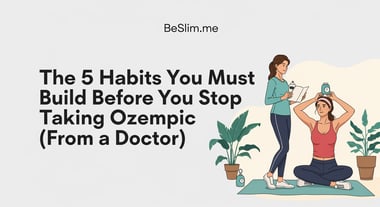Hello, I'm Master Kim, your Empathic Storyteller and Editor at BeSlim.me. I've had the privilege of hearing countless stories of real people transforming their health, and today, I'm sharing one that's close to my heart. This isn't just a tale of numbers on a scale—it's about the raw, human struggle to reclaim control over your body and mind. As we step into 2026, health trackers like CGM, Oura, and Lumen are revolutionizing how we understand our bodies, turning data into actionable insights. But remember, these tools aren't magic; they're companions on a journey that demands patience, effort, and self-compassion. Let me walk you through my own experience—yes, this is my story, told honestly from the trenches. If you've ever felt trapped in a cycle of failed diets and fleeting motivation, I see you. You're not alone, and there's hope ahead.
Part 1: The Struggle (The 'Before')
I remember the weight of it all—literally and figuratively. Back in early 2025, I was staring at myself in the mirror, feeling like a stranger in my own skin. At 5'10" and tipping the scales at 220 pounds, I wasn't just carrying extra weight; I was burdened by years of emotional eating, stress-fueled binges, and a nagging sense of defeat. My days blurred into a haze of desk work, late-night snacks, and restless sleep that left me exhausted before the sun even rose. I'd wake up with that familiar fog—low energy, irritability, and a gnawing hunger that no amount of willpower could silence.
It wasn't always like this. In my younger years, I was active, playing weekend soccer and hiking with friends. But life happened: a demanding job in tech, the isolation of remote work during the lingering effects of the pandemic, and the slow creep of habits that prioritized convenience over health. I tried everything—or so I thought. Keto diets that left me crashing after a week, intermittent fasting that turned into all-day grazing, gym memberships that gathered dust. Each failure chipped away at my confidence. "Why can't I just stick to it?" I'd ask myself, tears welling up after yet another scale reading that mocked my efforts.
Emotionally, it was a storm. The shame of avoiding social gatherings because my clothes didn't fit, the envy scrolling through fitness influencers on social media, the quiet despair of feeling like my body was betraying me. I knew the science behind it—things like leptin resistance, where my body's hunger signals were out of whack, making me feel starved even when I wasn't. But knowledge alone didn't help; it just amplified the frustration. My cortisol levels were probably through the roof from chronic stress, fueling fat storage around my midsection. Sleep? Forget it. I'd toss and turn, haunted by work emails and midnight cravings, only to drag myself through the next day on caffeine and sheer grit.
Failed attempts piled up like unread self-help books on my shelf. I dabbled in apps that tracked calories, but they felt impersonal, like shouting into a void. Wearables? I'd tried a basic fitness tracker, but it just counted steps without telling me why I felt so drained. By mid-2025, I hit rock bottom: a doctor's visit revealed prediabetes markers, high blood pressure, and a BMI that screamed "urgent change." The fear was real, but so was the overwhelm. How could I fix this when everything I'd tried before crumbled under the weight of real life?
Part 2: The Turning Point (The 'Solution')
The shift didn't come from a lightning bolt of inspiration—it was more like a quiet whisper amid the chaos. It was late 2025, and I'd stumbled upon a BeSlim.me webinar about the "quantified self" movement in 2026. The idea? Using advanced health trackers to turn vague feelings into concrete data, empowering real change. Intrigued, I decided to invest in three devices that promised synergy: a Continuous Glucose Monitor (CGM) for real-time blood sugar insights, an Oura Ring for sleep and recovery tracking, and a Lumen device for monitoring my metabolism through breath analysis. These weren't just gadgets; they were my new allies in understanding the why behind my struggles.
Setting them up felt daunting at first, but the apps were intuitive, syncing seamlessly to give me a holistic view. The CGM, clipped to my arm, started revealing patterns I'd never seen. Spikes in blood sugar after my "healthy" morning oatmeal explained the mid-morning crashes and cravings—turns out, my body wasn't processing carbs efficiently, a common sign of insulin resistance. Scientifically, this ties into leptin resistance, where chronic high blood sugar disrupts hunger hormones, making weight loss feel impossible leptin resistance and its role in obesity. Armed with this data, I adjusted my meals, swapping refined carbs for balanced proteins and fats, not as a strict diet but as informed tweaks.
Then there was the Oura Ring, a sleek band that tracked my sleep stages, heart rate variability (HRV), and readiness scores. It showed how my poor sleep was spiking cortisol, the stress hormone that promotes fat storage and hinders recovery. Research backs this: elevated cortisol from sleep deprivation can sabotage weight loss by increasing appetite and reducing muscle repair cortisol's impact on weight gain and stress management. I started prioritizing wind-down routines, like dimming lights and avoiding screens, based on Oura's insights. It wasn't overnight, but seeing my HRV improve motivated me to build habits, not chase perfection.
Lumen rounded out the trio, a handheld device that measures metabolic flexibility—how well my body switches between burning carbs and fats—via breath. In 2026, it's become a game-changer for personalized nutrition. My readings showed I was stuck in carb-burning mode, inefficient for fat loss. By integrating this with CGM data, I experimented with meal timing to boost fat adaptation, drawing on principles of habit formation from behavioral science. Think atomic habits: small, consistent changes like a post-dinner walk to stabilize glucose, reinforced by real-time feedback habit formation and its neurological basis.
The real magic was integration. These devices talked to each other through a unified app dashboard (thanks to 2026's AI advancements), creating a feedback loop. No more guessing—I had data-driven nudges, like "Your sleep score is low; opt for a lighter dinner." But let's be clear: this wasn't effortless. It took effort to log meals, interpret trends, and resist old habits. The turning point was emotional too—shifting from self-criticism to curiosity. "What does my body need right now?" became my mantra, fostering a compassionate approach that science shows sustains long-term change.
Part 3: The Success (The 'After')
Fast forward six months, and the transformation was profound—not just in the 30 pounds I'd shed, bringing me to a healthier 190 pounds, but in how I felt. Energy that sustained me through the day, clothes that fit without tugging, and a confidence that radiated into my work and relationships. Social outings? I embraced them, no longer hiding behind excuses. My prediabetes markers normalized, blood pressure dropped, and for the first time in years, I slept soundly, waking refreshed.
The data painted the picture: CGM showed stable glucose levels, reducing those energy dips. Oura's metrics improved—deeper sleep cycles and higher HRV meant better stress management and recovery. Lumen confirmed metabolic shifts, with more time in fat-burning mode, making weight maintenance feel natural rather than forced. But beyond the tech, it was the psychological wins: breaking free from emotional eating by addressing cortisol triggers, rebuilding trust in my body's signals, and forming habits that stuck because they were rooted in understanding, not restriction.
Life transformed in unexpected ways. I hiked again, reconnected with friends over active outings, and even mentored colleagues on their health journeys. The weight loss was a byproduct of holistic change—effort, consistency, and tools that illuminated the path. There were setbacks, like holiday indulgences that spiked my readings, but the devices helped me course-correct without guilt. In 2026, these trackers aren't just "best" for their tech; they're empowering because they make health personal and sustainable.
Key Lessons for Your Journey
Embrace Data as a Guide, Not a Judge: Start with one tracker to avoid overwhelm, and use insights to build small, compassionate habits—like adjusting meals based on glucose feedback—rather than chasing perfection.
Prioritize Sleep and Stress for Metabolic Wins: Track your recovery with tools like Oura to manage cortisol; aim for 7-9 hours of quality sleep nightly, incorporating routines that promote relaxation for better weight management.
Build Flexibility Through Integration: Combine devices like CGM, Oura, and Lumen to understand your unique metabolism; experiment with meal timing and activity to foster habit formation, remembering that consistency over time trumps quick fixes.
If my story resonates, know that your journey matters. At BeSlim.me, we're here to support you with empathetic guidance and tools tailored to real life. You've got this—one data point, one step at a time.
References
- Leptin resistance and its role in obesity - ncbi.nlm.nih.gov
- Cortisol's impact on weight gain and stress management - mayoclinic.org
- Habit formation and its neurological basis - newsinhealth.nih.gov
Medical Disclaimer
The content on this website is for informational and educational purposes only. It is not intended as medical advice and should not be relied upon as a substitute for consultations with qualified healthcare professionals who are familiar with your individual medical needs. Always seek the advice of your physician or other qualified healthcare provider with any questions you may have regarding a medical condition. Never disregard professional medical advice or delay in seeking it because of something you have read on this website.




